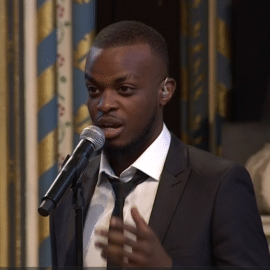Oracy
The effective use of spoken language – or oracy – is an important skill for young people to develop if they aspire to success in their later lives and professional careers.
Throughout pupils’ time at QE, we intentionally create opportunities for the boys to foster their ability to express themselves fluently and grammatically in speech. Being able to converse comfortably with adults, and particularly to initiate conversations, is a quality that we regard as especially important for our boys.
Confidence plays a significant role in all of this – it is, after all, one third of our mission statement, which states that we seek to produce young men who are ‘confident, able and responsible’. It is therefore important that all boys – and perhaps especially those who do not consider themselves confident – purposely seek out opportunities to speak up in public settings or to make conversation with adults.
The other half of the equation is the ability to use language well. Our widespread use of class and tutor group discussions naturally develops in boys a ready facility with words as they learn from their teachers and from each other. English teaching will help boys correct any infelicities of expression.
Our pupils can learn much in this regard from the work of accomplished practitioners of the spoken word, such as our sometime poet-in-residence Anthony Anaxagorou (OE 1994–1999) and George Mpanga (OE 2002–2009) – two poets who have risen to national and international prominence in recent years.
Participation in Drama helps boys develop mastery of verbal expression, enabling them not only to learn to enunciate clearly, but also to gain an understanding of how areas such as body language and the expression of emotion can aid or hinder communication.
Our visiting speakers are experts in their fields. We encourage boys to listen carefully to what they say and then to ask apposite questions in the Q&A sessions that normally follow such talks.
Debating has long been a strength of QE. In the crucible of the debating chamber, boys quickly learn how to structure arguments and then think on their feet in order to respond to opposing views when their arguments are challenged. For our senior boys, debating opportunities range from prestigious national and international competitions to our annual Dinner Debate, in which sixth-formers challenge visiting Old Elizabethans.
Large numbers of our younger boys take part in the public-speaking and listening awards run by LAMDA (London Academy of Music and Dramatic Art), in which a high proportion pass with distinction.
The less formal setting of our academic symposia with leading girls’ schools provides another forum in which boys can develop both their analytical skills in formulating arguments and also their social and conversational skills as they interact with members of the opposite sex.
All these extra-curricular opportunities build upon the work done within the classroom, across academic departments. For more information, see our page about Dialogic teaching and learning in our Academic Programme menu.
One other route to developing confidence and the ability to converse well with both fellow pupils and adults is through taking on positions of responsibility within the School. These include, for example, official roles, from Lower School Form Captains and House representatives up to the School Captain, as well as captaincy of sports teams or student leadership roles in our performing arts events.
George 'the Poet' Mpanga
Spoken-word artist and rapper George Mpanga has performed before the Queen in Westminster Abbey; he has been fêted by critics and literature festival audiences alike, and he has even appeared before a TV audience of millions at the opening ceremony of the Rugby World Cup, yet his poetry is politically charged and focuses on justice for the most disadvantaged in society.
George (OE 2002–2009) took up a place at King’s College, Cambridge, to read Politics, Psychology and Sociology after his A-levels. His first poetry collection, Search Party, was published in 2015. He has maintained strong links with QE and was a well-received guest speaker at the Year 12 formal Luncheon, as well as leading a poetry workshop for the whole of Year 9.

